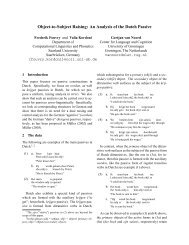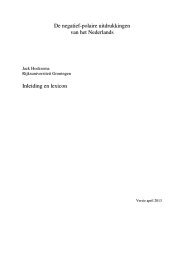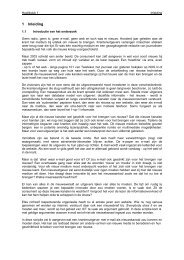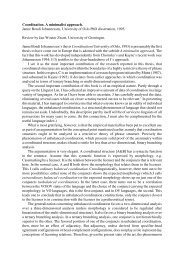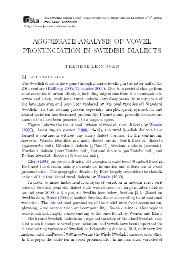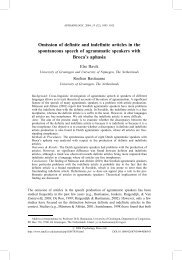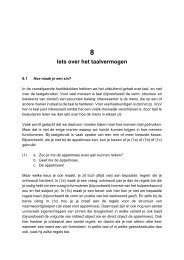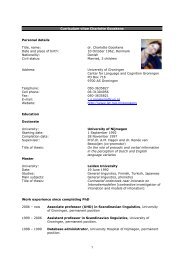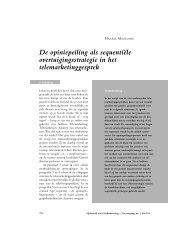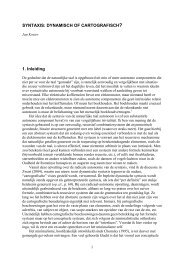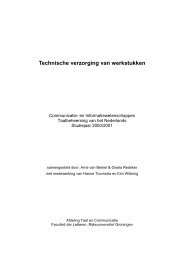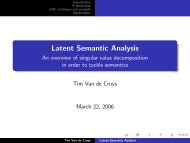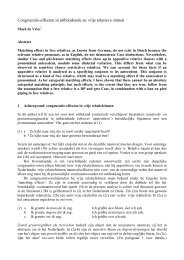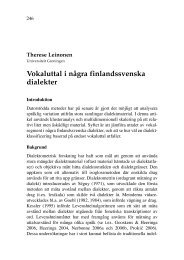The Focus Sensitivity of Sentence Adverbs Sophia Döring ...
The Focus Sensitivity of Sentence Adverbs Sophia Döring ...
The Focus Sensitivity of Sentence Adverbs Sophia Döring ...
Create successful ePaper yourself
Turn your PDF publications into a flip-book with our unique Google optimized e-Paper software.
<strong>The</strong> <strong>Focus</strong> <strong>Sensitivity</strong> <strong>of</strong> <strong>Sentence</strong> <strong>Adverbs</strong><br />
<strong>Sophia</strong> <strong>Döring</strong>, Humboldt-Universität zu Berlin<br />
s.doering@rz.hu-berlin.de<br />
Within the field <strong>of</strong> information structure, focus sensitivity still is the topic <strong>of</strong> ongoing<br />
discussions. <strong>Focus</strong>-sensitive expressions crucially refer in their interpretation to the<br />
placement <strong>of</strong> focus in the sentence. While only and other so-called focus particles have<br />
been investigated as prime examples <strong>of</strong> this phenomenon, the question <strong>of</strong> whether<br />
sentence adverbs (SADV) display a similar behavior has received much less attention in<br />
the literature. Only quantifying adverbs as usually have been mentioned with regard to<br />
focus, (cf. Lewis 1975, Rooth 1995, Krifka 2001), a systematic analysis <strong>of</strong> the focussensitivity<br />
<strong>of</strong> modal adverbs (probably, definitely) as well as <strong>of</strong> evaluative adverbs<br />
(fortunately, surprisingly) is still missing.<br />
<strong>The</strong> following examples illustrate that evaluative adverbs like unfortunately are indeed<br />
focus sensitive:<br />
(1) a. Unfortunately George gave [the letter] F to Mary.<br />
b. Unfortunately George gave the letter to [Mary] F .<br />
According to (1) a, the speaker resents the fact that it is the letter that George gave to<br />
Mary, in sentence (1) b, he is unhappy about the fact that it was Mary who the letter was<br />
given to. If unfortunately is replaced by probably or maybe, the adverb meaning<br />
likewise takes into account the sentence focus.<br />
<strong>The</strong> goal <strong>of</strong> the present paper is to analyse in detail the focus sensitivity <strong>of</strong> SADVs and to<br />
relate it to the adverbs' meaning. Although modal adverbs are intensional operators and<br />
evaluatives are not, we want to show that they basically work in the same way.<br />
For the detailed analysis <strong>of</strong> an expression's focus sensitivity, Beaver/Clark's (2008)<br />
classification <strong>of</strong> different mechanisms <strong>of</strong> association with focus proves highly valuable:<br />
An item can be quasi-, free- or conventionally associating with focus depending on<br />
whether its focus sensitivity is “lexically encoded or a non-conventionalized<br />
epiphenomenon” (Beaver/Clark 2008:41). <strong>The</strong>se different mechanisms or “strengths” <strong>of</strong><br />
focus sensitivity determine whether the item requires an intonationally stressed element<br />
within its scope: Conventionally associating expressions as only are “strongly” focus<br />
sensitive and always need such an element they can associate with, while quasiassociating<br />
expressions do not.<br />
Applying this characteristic to our analysis <strong>of</strong> SADVs, our testing involves the use <strong>of</strong><br />
leaners on the phonological level, movement <strong>of</strong> the focus outside the scope <strong>of</strong> the<br />
operator on the syntactic level, and, on the semantic-pragmatic level, the addition <strong>of</strong><br />
presuppositions which the operator can associate with alternatively. All <strong>of</strong> these lead to<br />
constructions where the scope <strong>of</strong> the adverb lacks a stressed element.<br />
Interestingly, modal and evaluative adverbs behave differently in some <strong>of</strong> these tests, as<br />
(2) illustrates:<br />
(2) A: Do you know whether Paul ate anything during the party?<br />
B: Yes, [chocolate cake] F I think Paul probably ate t.
B': ?Well, yes! [Chocolate cake] F I think Paul surprisingly ate t, although he<br />
always tells me that chocolate cake makes him put on weight!<br />
Usually, the SADV would associate with a constituent in its c-command domain, but as<br />
the verb is already mentioned in A’s question, it constitutes background information.<br />
<strong>The</strong> reading where probably associates with chocolate cake, which is focused but moved<br />
outside the adverb's scope, is readily available in answer B. In the case <strong>of</strong> surprisingly in<br />
B', however, this reading is much less easily available, although not impossible.<br />
Another difference can be observed when choosing a sentence that involves a<br />
presupposition, as (3) does:<br />
(3) a. Charlotte probably took [someone] F to the movies.<br />
b. #Charlotte surprisingly took [someone] F to the movies.<br />
c. Charlotte typically takes [someone] F to the movies.<br />
<strong>The</strong> adverb could associate with the focused constituent someone, but that would result<br />
in a completely uninformative statement: '<strong>The</strong> single person that Charlotte<br />
probably/surprisingly/ typically took to the movies was someone'.<br />
In (3), however, only the version with the evaluative adverb is uninformative, a and c are<br />
not. In these two cases the adverb obviously does not associate with the focus, but<br />
instead with the presupposition which can be paraphrased as: 'It is probable that, when<br />
Charlotte has gone to the movies, she took someone there'.<br />
Following Beaver/Clark's (2008) model, we claim that modal as well as evaluative<br />
adverbs display free association with focus. <strong>The</strong> examples above, however, also suggest<br />
that evaluative adverbs seem to be less flexible with respect to the placement <strong>of</strong> their<br />
associated focus. This observation might be attributed to differences in the adverb<br />
semantics, which will be illustrated by formal analyses <strong>of</strong> the two classes <strong>of</strong> adverbs. <strong>The</strong><br />
graduation <strong>of</strong> certainty as expressed by modal adverbs can be described in terms <strong>of</strong><br />
modal logic, using an epistemic accessibility relation and the notions <strong>of</strong> possibility and<br />
necessity as proposed by Kratzer (1991). Evaluative SADVs, on the other hand, can be<br />
treated as expressive meaning which may be analysed as a conventional implicature that<br />
operates upon at-issue content (cf. Potts 2003).<br />
References<br />
Beaver/Clark (2008). Sense and <strong>Sensitivity</strong>: How <strong>Focus</strong> Determines Meaning. Wiley &<br />
Sons.<br />
Kratzer (1991). Modality. In: von Stechow/Wunderlich (eds). Semantics: An<br />
International Handbook <strong>of</strong> Contemporary Research. de Gruyter, 639-50.<br />
Krifka (2001). Non-Novel Indefinites in Adverbial Quantification. In: Condoravdi/de<br />
Lavalette. Logical Perspectives on Language and Information. CSLI Publications, 1-40.<br />
Lewis (1975). <strong>Adverbs</strong> <strong>of</strong> Quantification.” In: Portner/Partee (eds). Formal Semantics:<br />
<strong>The</strong> Essential Readings. Blackwell, 178-88,<br />
Potts (2003). Expressive Content as Conventional Implicature. In: Proceedings NELS<br />
33. 303-22.<br />
Rooth (1995). Indefinites, <strong>Adverbs</strong> <strong>of</strong> Quantification, and <strong>Focus</strong> Semantics. In:<br />
Carlson/Pelletier (eds). <strong>The</strong> Generic Book. University <strong>of</strong> Chicago Press, 265–99.



